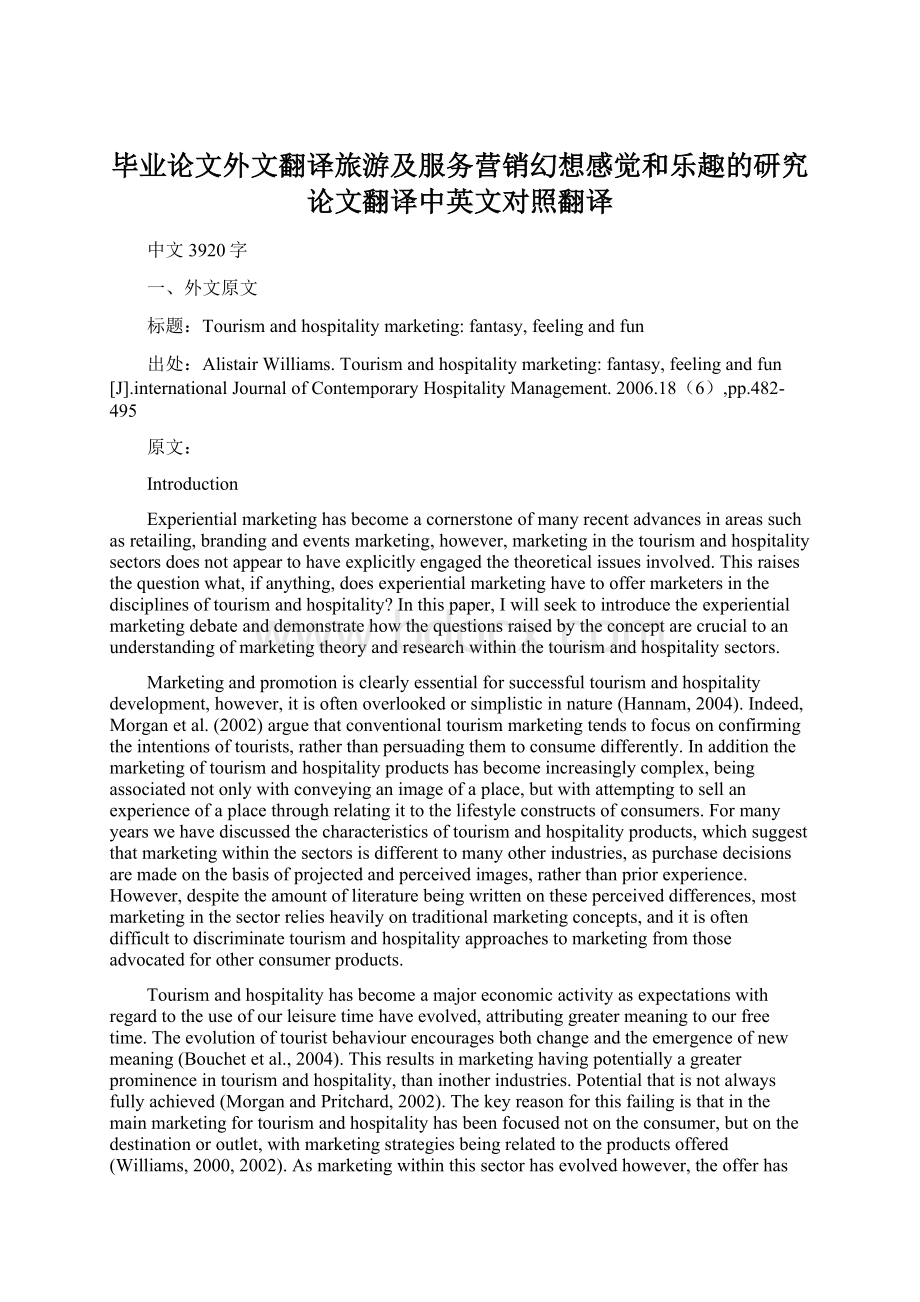毕业论文外文翻译旅游及服务营销幻想感觉和乐趣的研究论文翻译中英文对照翻译.docx
《毕业论文外文翻译旅游及服务营销幻想感觉和乐趣的研究论文翻译中英文对照翻译.docx》由会员分享,可在线阅读,更多相关《毕业论文外文翻译旅游及服务营销幻想感觉和乐趣的研究论文翻译中英文对照翻译.docx(8页珍藏版)》请在冰豆网上搜索。

毕业论文外文翻译旅游及服务营销幻想感觉和乐趣的研究论文翻译中英文对照翻译
中文3920字
一、外文原文
标题:
Tourismandhospitalitymarketing:
fantasy,feelingandfun
出处:
AlistairWilliams.Tourismandhospitalitymarketing:
fantasy,feelingandfun[J].internationalJournalofContemporaryHospitalityManagement.2006.18(6),pp.482-495
原文:
Introduction
Experientialmarketinghasbecomeacornerstoneofmanyrecentadvancesinareassuchasretailing,brandingandeventsmarketing,however,marketinginthetourismandhospitalitysectorsdoesnotappeartohaveexplicitlyengagedthetheoreticalissuesinvolved.Thisraisesthequestionwhat,ifanything,doesexperientialmarketinghavetooffermarketersinthedisciplinesoftourismandhospitality?
Inthispaper,Iwillseektointroducetheexperientialmarketingdebateanddemonstratehowthequestionsraisedbytheconceptarecrucialtoanunderstandingofmarketingtheoryandresearchwithinthetourismandhospitalitysectors.
Marketingandpromotionisclearlyessentialforsuccessfultourismandhospitalitydevelopment,however,itisoftenoverlookedorsimplisticinnature(Hannam,2004).Indeed,Morganetal.(2002)arguethatconventionaltourismmarketingtendstofocusonconfirmingtheintentionsoftourists,ratherthanpersuadingthemtoconsumedifferently.Inadditionthemarketingoftourismandhospitalityproductshasbecomeincreasinglycomplex,beingassociatednotonlywithconveyinganimageofaplace,butwithattemptingtosellanexperienceofaplacethroughrelatingittothelifestyleconstructsofconsumers.Formanyyearswehavediscussedthecharacteristicsoftourismandhospitalityproducts,whichsuggestthatmarketingwithinthesectorsisdifferenttomanyotherindustries,aspurchasedecisionsaremadeonthebasisofprojectedandperceivedimages,ratherthanpriorexperience.However,despitetheamountofliteraturebeingwrittenontheseperceiveddifferences,mostmarketinginthesectorreliesheavilyontraditionalmarketingconcepts,anditisoftendifficulttodiscriminatetourismandhospitalityapproachestomarketingfromthoseadvocatedforotherconsumerproducts.
Tourismandhospitalityhasbecomeamajoreconomicactivityasexpectationswithregardtotheuseofourleisuretimehaveevolved,attributinggreatermeaningtoourfreetime.Theevolutionoftouristbehaviourencouragesbothchangeandtheemergenceofnewmeaning(Bouchetetal.,2004).Thisresultsinmarketinghavingpotentiallyagreaterprominenceintourismandhospitality,thaninotherindustries.Potentialthatisnotalwaysfullyachieved(MorganandPritchard,2002).Thekeyreasonforthisfailingisthatinthemainmarketingfortourismandhospitalityhasbeenfocusednotontheconsumer,butonthedestinationoroutlet,withmarketingstrategiesbeingrelatedtotheproductsoffered(Williams,2000,2002).Asmarketingwithinthissectorhasevolvedhowever,theofferhasbecomeincreasinglylessimportantduetotheenormousheterogeneityofconsumermotivationandbehaviour.Theresultisthatfirmsanddestinationswithinthissectorneedtoredefinetheirstrategiestoreflectthesechanges.
Studyingthebehaviourofconsumershasbecomeincreasinglycomplex,anditisfairtoarguethat
tourismandhospitalitybyitsverynature,shouldbeinthevanguardofresearchintocontemporaryconsumers(Williams,2002).Tourismandhospitalityoffersamultitudeofvenuesinwhichpeoplecanconsume.Bars,restaurants,hotels,themeparks,casinosandcruiseshipsalloperateas“Cathedralsofconsumption”(Ritzer,1999)offeringincreasinglycomplexconsumptionopportunitiestoincreasinglycomplexconsumers.Tourismandhospitalityhasdevelopedintooneofthemostimportantglobaleconomicactivities,dueinparttoacombinationofatransformationofoffersandincreasinglypostmoderndemand.Thesechangesmeanthattourismandhospitalityconsumptionhasevolvedtobecomemorequalitative,moredemanding,andmorevaried(Bouchetetal.,2004).
Anecdotalevidencedeliveredthroughmediacoverage,wouldsuggestthatcontemporary
consumersareself-indulgent,pleasureseekingindividuals,easilydominatedbymarketersandadvertisers,whoactlikesheepinthewaystheymimicreferentothers.However,therealityisobviouslymuchmorecomplexthansuchascenariosuggests.Contemporaryconsumersareaslikelytobedrivenbythriftastotheyaretobehedonistic,theyuseconsumptiontomakestatementsaboutthemselves,theyuseconsumptiontocreatetheiridentitiesandtheydevelopasenseofbelongingthroughconsumption.Formanypeopleitisthroughconsumptionthatrelationshipsareformed,forexample,colleaguesenjoyingadrinkafterworkorchildrenhostingtheirbirthdaypartiesatMcDonalds,enablingthemtodefinetheircircleoffriends.Consumptionalsoplaysapartinfindingfulfilment,developingcreativity
andexpressingtheirindividualabilities.Clearlysuchacomplexphenomenacannotbeeasilyunderstood.1111Recentargumentshavebeensoundedthataspectsofcontemporarytourismandhospitalityconsumptionhavereflectedthephenomenaofpostmodernism.Whilstmanybelievepostmodernismtobeameaninglessintellectualfad,inaccessibletomanyinvolvedinmarketingwithinoursector,othersagreethatthereareworthwhileinsightstobegainedfromthedebateonthepost-modernconditionanditsconsequencesfortourismandhospitalityconsumptionandmarketing.Idonotintendtodiscussatlengththeuseofpost-moderndiscourseintourismandhospitalitymarketingasIhaveexerciseditinpreviouswork(Williams,2000,2002).Thetermpostmodernismreferstoabreakinthinkingawayfromthemodern,functionalandrational,andduringthelastcoupleofdecadesithasspreadacrossalldomainsofknowledge,includingmarketing.Thekeyconceptsofpost-modernmarketingarefragmentation,indeterminacyanddistrustofuniversaldiscourse,butbyeschewingmodernismitintroducesaradicallynewanddifferentculturalmovementwhichcoalescesinareconceptualisationofhowweexperienceandexplainourworld.Intermsofexperientialmarketingtwoaspectsofthe
post-moderndiscoursearemostrelevant,hyperealityandimage.
Hyperealityisoneofthemostdiscussedconditionsofpostmodernism,andreferstotheargument
thatrealityhascollapsedandhasbecomeimage,illusion,simulationandsimulacra(copiesforwhichnooriginalexists).Hyperrealityreferstoablurringofdistinctionbetweentherealandtheunrealinwhichtheprefix“hyper”signifiesmorerealthanreal.Whentherealisnolongeragivenbutisreproducedbyasimulatedenvironment,itdoesnotbecomeunreal,butrealerthanreal,totheextentitbecomeswhatBaudrillard(1993,p.23)referstoas“ahallucinatoryresemblanceofitself”.Inpostmodernism,withtheadventofhyperreality,simulationscometoconstituterealityitself.Thisscenarioisexemplifiedthroughoutthetourismandhospitalityindustry.BaudrillardhimselfusedtheexampleofDisneyland,arguingitismorerealthantheUSAitself.ApointreinforcedbyVenturi(1995,p.67)whosuggested“Disneylandisnearertowhatpeoplewantthanwhatarchitectshaveevergiventhem.DisneylandisthesymbolicAmericanutopia”.Inpostmodernsocietypeoplehavebecomefascinatedbysignsandasaresult,theyexistinastatewheresignsandimageshavebecomemoreimportantthanwhattheystandfor.Theresultisthattoday’sconsumersconsumeimageryanddonotfocusonwhattheimagesrepresentormean.AsMillerandReal(1998,p.30)argue“weliveinaworldwheretheimageorsignifierofan
eventhasreplaceddirectexperienceandknowledgeofitsreferentorsignified”.
Whileitisacceptedthatthereareproblemswithinvestigatingtourismandhospitalitymarketing
throughapostmodernorientation,itclearlyencompassesabroadrangeofconsumerexperiences.Inadditionithasthepotentialtoreframeourthinkingaboutmarketingpracticeinanincreasinglyfragmentedglobalmarketplace.Abetterunderstandingoftheunderlyingmacroforcesandmicrobehaviour,associatedwithpostmodernism,canbeleveragedbymarketerstoobtaincompetitiveadvantagesintheincreasinglydynamic,unpredictable,unstableandcompetitivetourismandhospitalityenvironment.
Traditionalmarketingprovidedavaluablesetofstrategies,implementationtoolsand
methodologiesthattourismandhospitalityfirmscoulduseinanearlierage.AsSchmitt(1999,p.55)argued“traditionalmarketingwasdevelopedinresponsetotheindustrialage,nottheinformation,brandingandcommunicationsrevolutionwearefacingtoday”.Inanewage,withnewconsumersweneedtoshiftawayfromafeatures-and-benefitsapproach,asadvocatedbytraditionalapproachestoconsumerexperiences.Weneedtoconsidernewconceptsandapproacheswhichcapitaliseontheopportunitiesofferedbythesenewconsumers.Onesuchapproachisexperientialmarketing;anapproachwhichincontrasttotherationalfeatures-and-benefitsviewofconsumers,takesamorepostmodernorientationandviewsthemasemotionalbeings,concernedwithachievingpleasurableexperiences.
Experientialmarketingisagrowingtrendworldwide,withenthusiastsreportedinallsectorsofthe
globaleconomy,fromconsumerproductssuchasFordMotorCompany(Kerwin,2004)tohealthcareproviderssuchastheNorthHawaiiCommunityHospital(Hill,2003).AsSchmitt(1999,p.53)states“experientialmarketingiseverywhere”.Thequestioniswhathascausedthisevolutionintheworldof
marketing,andwhataretheimplicationsforconsumersoftourismandhospitality?
ExperientialmarketingwasfirstintroducedbyPineandGilmore(1998)aspartoftheirworkonthe
experienceeconomy,andfurtherrefinedinmanysubsequentarticlesand